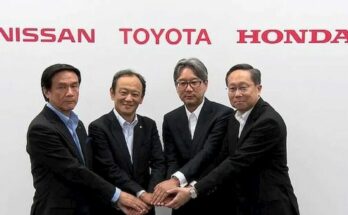The Japanese government has issued a warning to Pakistan, indicating a potential move to the World Trade Organization (WTO) over the mandated export of vehicles by its car manufacturers in Pakistan.
This development follows Pakistan’s directive to its three major Japanese car assemblers— Suzuki, Toyota, and Honda — to increase their export activities, a demand seen by Japan as a violation of WTO regulations.
The controversy centers around the Auto Industry Development and Export Policy (AIDEP) 2021-26, which enforces a gradual increase in export obligations for automobile manufacturers in Pakistan, setting targets that reach 10% of their total imports by 2025-26. This policy, alongside Pakistan’s adherence to the United Nations Economic Commission for Europe (UNECE) WP-29 vehicle regulations, aims to boost the local automotive industry’s export capacity.
However, the Special Investment Facilitation Council (SIFC) observed a lack of export initiatives by these Japanese firms, leading to a temporary suspension of their import quotas. The Pakistani government has requested revised export plans from these companies to align with the AIDEP objectives.
Japan has formally expressed its concerns through multiple channels, including Pakistan’s WTO and Tokyo missions and its Commerce and Industries ministries, arguing that the forced export policy infringes on WTO agreements. Pakistan on the other hand, maintains that its actions comply with WTO rules.
The issue is set for bilateral discussions between the two governments, with the possibility of escalation to the WTO if a mutual agreement is not reached. The WTO dispute resolution process may be invoked if Japan remains dissatisfied with Pakistan’s justifications, potentially leading to formal proceedings.
The car manufacturers argue their non-competitiveness in exports is due to additional tariffs, the lack of free trade agreements (FTAs) for automotive parts, and the limited market for right-hand drive vehicles. They advocate for zero-rated FTAs and local industry development to enhance export competitiveness.
Currently, the auto sector in Pakistan faces 25 legal cases, predominantly involving new market entrants, highlighting the sector’s broader regulatory and operational challenges. The Japanese Ambassador to Pakistan has also engaged with Pakistani officials to discuss these export and quota issues, underscoring the diplomatic and trade tensions between the two nations.
Source: Pakistan Today

Responsible for delivering local & international automotive news.




